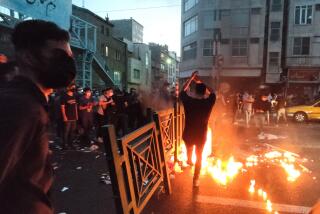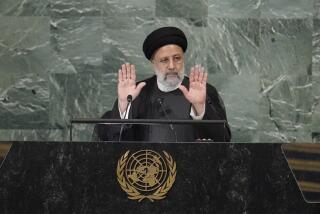Is an Iranian Overture to U.S. Up Next?
- Share via
CAIRO — Conservative Iranian newspapers have fiercely criticized the idea, and Iran’s supreme leader has ruled it out. But the question remains: Will the country’s new president, Mohammad Khatami, dare to try to build a bridge to the United States?
The answer should come today when Khatami, in a televised interview with the Cable News Network, launches what he has promised will be a “thoughtful dialogue” with “the great American people.”
So far, Western officials and analysts have been caught by surprise by his friendly tone and confident moves during five months in office to break down two decades of official hostility toward the United States, the country long stigmatized, in the lexicon of Iran’s theocratic leadership, as the “Global Arrogance” and “Great Satan.”
But Khatami’s steps have provoked resistance from hard-liners in the Iranian regime, most notably from Ayatollah Ali Khamenei, the supreme leader, who delivered a rare Friday sermon last week in which he sharply dismissed any suggestion that U.S.-Iranian relations are on the mend.
Conservatives in Iran have never liked Khatami, and in recent days they have stepped up their criticism of any change in Tehran’s U.S. policy. Over the airwaves, at mosques and in newspapers, they have declared that the United States remains Iran’s No. 1 enemy and that any talk of rapprochement is a fantasy.
“Any hands that reach out to America should be cut off,” said the hard-line paper Jomhori Islami.
But the strident anti-U.S. campaign seems only to underscore the fact that the question of repairing relations with the United States--a topic once taboo even for discussion in Iran--has now entered the mainstream of political debate.
Iranian political historian Sadiq Zibakalam, speaking by telephone Tuesday from Tehran, said he foresees “a very carefully balanced speech” from Khatami.
“He is under a lot of pressure from supporters and opponents of the rapprochement,” the analyst noted.
Khatami’s talk will be along the lines of “We have no quarrel with the American people and also that the American government is the representative of the American people,” Zibakalam predicted. “But he will also press the Iranian point of view and will call on the U.S. to shift the hard-line positions of the American government against the Islamic Republic.”
And unless the Clinton administration responds with “tangible and realistic signals,” it will be difficult for Khatami to overcome the barriers and difficulties to improving relations, he said.
So far, there has been rising interest in Iran over what Khatami will say. The English-language Tehran Times, which has opposed any softening toward Washington, said Tuesday that interviews with a cross section of Iranians showed that most believe “the time is not ripe” to resume formal ties with the United States.
The paper also quoted critics. “Resumption of ties with America is a defeat for Iran and would disappoint Muslims across the world,” said parliamentary deputy Hemmat Beig-Moradi. Any such move would be useless because of the “selfish approach” of U.S. officials, agreed another deputy, Mohammed Hussein Zare.
But rapprochement--so long as it does not translate into U.S. dominance of Iran--also has won supporters. “People are actually sticking their head out and talking about it,” Zibakalam said.
A policy of “close but equal relations with the United States has strong popular support in Iran,” said Ayatollah Mahmoud Tabatabai Qomi, a senior Iranian cleric and Khatami supporter, in an interview last month in the Saudi pan-Arab daily Asharq al Awsat.
The pro-dialogue camp sees economic benefit in detente with the United States, Zibakalam said. It could pave the way for better relations with Iran’s oil-rich Persian Gulf neighbors, such as Saudi Arabia, Kuwait and the United Arab Emirates. It could lead to Iran’s recovering billions of dollars of its assets frozen in the United States since the 1979 revolution.
The United States also might be persuaded to suspend its efforts to block former Soviet republics from cooperating with Iran in exploiting the oil-and-gas wealth of the Caspian region.
Other Iranians simply see a need for Khatami to present Iran’s positions directly to Americans to counteract what they regard as years of “demonization” of their country.
“The misconceptions of the people of the United States . . . must be corrected,” Deputy Foreign Minister Mohammed Javad Zarif said recently.
As of Tuesday, the interview was scheduled to be taped today for broadcast on CNN at 3 p.m. PST. Although that will be 2:30 a.m. Thursday in Tehran, some Iranians plan to stay up and watch. Most Iranians see Western broadcasts only with illegal satellite dishes, kept hidden by day and uncovered at night.
It was unclear Tuesday whether state television, under control of the hard-liners, will replay excerpts later. One official said he did not think Khatami’s message will be affected by Khamenei’s harsh criticism of rapprochement.
“Why should it?” this official asked, noting that the splits between Khatami, the elected president, and Khamenei, the spiritual leader, are already well known.
Although some commentators say that only Khamenei, as supreme leader, has the power to shift policy toward Washington, Qomi said that Khatami--who won office with the backing of 70% of Iranian voters--would not have started down that road unless he felt sure of himself.
“In the final analysis, Khatami is the head of the Iranian government,” said Qomi, whose remarks were translated into English by the Mideast Mirror monitoring service. “The shrill voices of a losing minority will not affect the mainstream of Iranian politics.”
More to Read
Sign up for Essential California
The most important California stories and recommendations in your inbox every morning.
You may occasionally receive promotional content from the Los Angeles Times.










